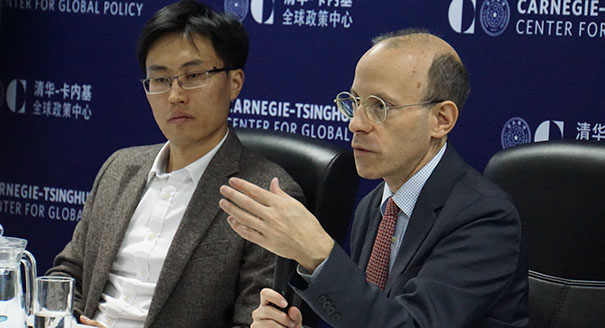Registration
You will receive an email confirming your registration.
China, Russia, and the United States face the difficult task of maintaining the following aspects of trilateral nonproliferation cooperation: limiting vertical growth of nuclear forces, preventing horizontal nuclear proliferation to new countries, and enhancing barriers against terrorists’ use of weapons of mass destruction. Against the background of a fast-changing geostrategic environment and deepening competition among the big powers, what are the key issues for cooperation on traditional strategic arms control among these three countries? How much can they collaborate to solve regional nuclear proliferation challenges and counter nuclear terrorism?
Carnegie–Tsinghua’s Tong Zhao moderated a discussion with Richard Weitz, director and senior fellow at the Hudson Institute's Center for Political-Military Analysis, on the future of China-Russia-U.S. arms control and nonproliferation cooperation.
This event was off the record and held in English.
DISCUSSION HIGHLIGHTS
- Political Contradictions: The speakers pointed out that escalating U.S.-China and U.S.-Russia tensions make engaging in dialogue on nonproliferation, arms control, and other security issues more difficult for nuclear-armed countries. But U.S. Vice President Mike Pence’s speech at the Hudson Institute, though highly critical of China, showed that there is still space for U.S.-China cooperation on security, as it did not challenge Chinese policy on North Korea or Iran, they said.
- Arms Control: The discussants highlighted missile defense as a factor that will increasingly influence nuclear stability and security relations among China, Russia, and the United States. Moscow’s concerns about growing American missile defense capabilities resulted in its developing new nuclear delivery systems. China has also voiced its displeasure with and responded to Washington’s missile defense system in Northeast Asia. The speakers also expressed concern that the United States and Russia might not soon break their deadlock on bilateral arms control cooperation. Finally, the discussants stated that Russia views nuclear weapons as crucial for maintaining its position as a great power and is unlikely to want to decrease its arsenal.
- Nonproliferation Cooperation: The speakers agreed that one of the main challenges in denuclearizing the Korean Peninsula is building a multilateral agreement based on North Korea’s bilateral relations with concerned states. The U.S.-China-Russia triangle could be used as a system to stabilize the denuclearization process, whereby China and Russia could press the United States to relax sanctions while drafting the agreement. Among the three countries, China is the most worried about further regional nuclear proliferation, as the emergence of another nuclear state could act as a barrier to Beijing’s leadership in the region.
- Lack of U.S. Interest in Countering Nuclear Terrorism: Whereas previous U.S. administrations were very concerned about nuclear terrorism, President Trump is focusing on other issues. Although the United States is currently not paying close attention, the international community remains highly focused on keeping nuclear materials away from non-governmental organizations. The speakers stated that China is playing a larger role in combating nuclear terrorism and that China and Russia are cooperating together on this issue.
Tong Zhao
Tong Zhao is a fellow in the Nuclear Policy Program at the Carnegie Endowment for International Peace, based at the Carnegie–Tsinghua Center for Global Policy in Beijing. His research focuses on strategic security issues, including nuclear weapons strategy, arms control, nonproliferation, missile defense, hypersonic weapons, space security, and other international security issues.
Richard Weitz
Richard Weitz is a senior fellow and director of the Center for Political-Military Analysis at the Hudson Institute. His current research includes regional security developments relating to Europe, Eurasia, and East Asia as well as U.S. foreign and defense policies.
